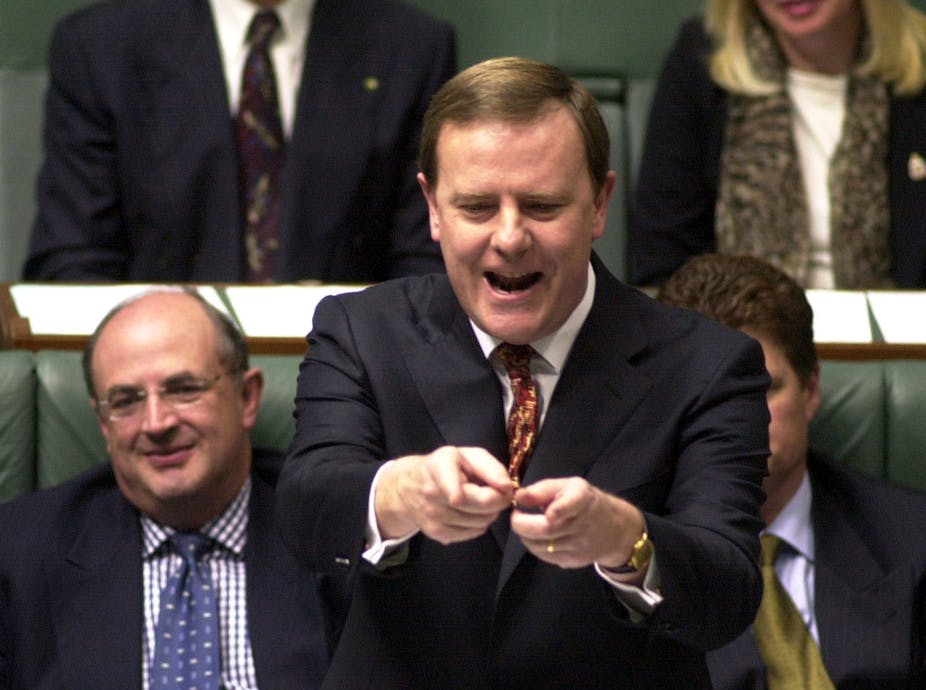Have you heard this song?
Infinite bottles of pop on the wall,
Infinite bottles of pop,
Take one down,
Share it around,
Infinite bottles of pop on the wall.
It’s the 21st-century version of “ten green bottles hanging on the wall”. “Infinite bottles of pop” has a distinct advantage over “ten green bottles”. The latter comes to a natural end, after ten iterations. Infinite bottles of pop just keeps on going.
On a recent family holiday, my seven-year-old nephew sang “infinite bottles” over and over. Soon, all the adults, despite our best efforts, could not get that damn song out of our heads.
The Coalition has its “infinite bottles of pop” song. It goes like this:
Labor’s debt and deficit.
Labor’s debt and deficit.
Labor’s debt and deficit.
It lacks the tune and rhythm of the kids’ version. But the Coalition understands the power of endless repetition. They know what it takes to get their song into our heads.
For nearly 20 years now, the Coalition has been singing this song loud and clear. On hilltops and by mountain streams. On the high road and the low road. In fact, pretty much anywhere you can eat green eggs and ham, Coalition members have intoned this tune.
In every budget speech of his tenure as treasurer, Peter Costello recruited the evil spectre of “Labor’s A$80 billion debt spree”. The figure below is a set of “concordance lines” for Costello’s budget speeches, from 1996 to 2007. In 12 speeches he referred directly to “Labor” 31 times, putting his budgets in the context of “Labor’s debt”, “Labor’s deficit” and “Labor’s recession”.

My concordance does not include Costello’s other references to the Hawke-Keating governments, such as “the previous government kept racheting up our debts – spending money it didn’t have”. The concordance also doesn’t show Costello’s many implicit references to the previous Labor government.
Costello used his “infinite bottles of pop” song to construct the legacy of Hawke and Keating on his terms, and to construct the legacy of the Howard government while it was still in power.
The significance of Costello’s rhetorical strategy is more stark when compared to Labor treasurer Wayne Swan’s budget speeches (of which there are six compared to Costello’s 12). If Costello is the benchmark, we could expect roughly 15 explicit references to the previous Coalition government. There are none.
The single use of the word “Coalition”, as seen in the figure below, in Swan’s six years was to complain that the Coalition, in opposition, was opposing the government. I have not been able to find any rhetorical consistency across Swan’s six budget speeches. They were, rhetorically, chaotic.

In opposition, the Coalition kept its “infinite bottles of pop” song going. It had other slogans to be sure. But, like a clattering of seven-year-olds in a kombi van, the Coalition stayed on song.
Words get their meanings through use. These meanings are not only the standard dictionary definitions. Words build up associations through their “collocations” – the other words that typically go with them. As the great British linguist, J.R. Firth, used to say, you know a word by the company it keeps.
Insistent reiterations of word combinations create a collocational pull. After a while, you don’t have to say “Labor”. You can just say “debt” and, in the right environment, it will mean “Labor’s debt”.
By the same token, you create the conditions where “Labor” comes to be, inexorably, associated with “debt and deficit”. The Coalition then gets the benefit of the other meanings that these words invoke: profligate, irresponsible, reckless. For the Coalition, “Labor’s debt and deficit” is a gift that keeps on giving.

Your mind reacts to these typical associations, even if you consciously reject them. I illustrate this point to my students, by asking what comes to mind when they hear the phrase “women’s work”.
Now back in government, the Coalition is still at it. Prime minister Tony Abbott recently announced the May budget will be handed down “to address Labor’s $667 billion debt legacy”. And in the first sitting of parliament for 2014, the song is being sung.
What is Labor’s “infinite bottles of pop song”? What, in the ALP’s view, is the chief failing of modern Coalition governments?
For various reasons, defining robust and plausible answers to these questions is not simple. But language affords its users endless rhetorical power. The tools are there, if Labor can work out how to use them.
To counter the Coalition’s success, Labor needs to find its song, one that responds to current events, but which also has rhetorical longevity. And then Labor needs to sing its song over and over.
By the time of the next election, Australians should feel like we’ve spent weeks and months on a road trip with a car full of bored seven-year-olds.

